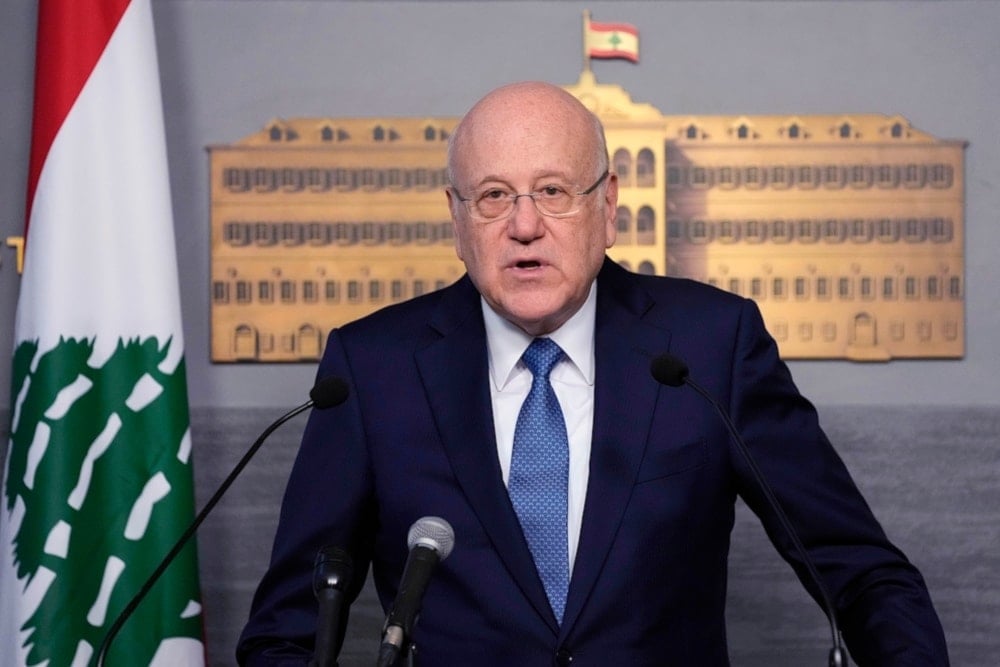Mikati presses for ceasefire enforcement amid Israeli violations
Lebanon's caretaker Prime Minister stresses the importance of holding all parties accountable to the ceasefire terms, underscoring that the enforcement of this agreement is essential for stability.
-

Lebanese caretaker Prime Minister Najib Mikati speaks at the government palace, in Beirut, Lebanon, on Monday, March 27, 2023. (AP)
Lebanon's caretaker Prime Minister, Najib Mikati, presided over an extraordinary cabinet session on Saturday in the southern city of Tyre. The meeting focused on reconstruction efforts and bolstering the deployment of the Lebanese army.
In his opening remarks, Mikati emphasized solidarity with the people of South Lebanon, stating, "We gather today to stand with the people of this land, addressing the pressing challenges they face along the border."
The Lebanese Prime Minister reiterated Lebanon’s strong commitment to the Lebanese Armed Forces (LAF) and the United Nations Interim Force in Lebanon (UNIFIL). He called on all relevant parties to accelerate the implementation of the ceasefire agreement, emphasizing that the government’s presence in Tyre serves as a clear statement of unwavering support for both the LAF and UNIFIL.
Mikati stressed the importance of holding all parties accountable to the ceasefire terms, underscoring that the enforcement of this agreement is essential for maintaining stability in the region.
In response to ongoing security threats, the top Lebanese official firmly asserted Lebanon’s resilience, declaring that the country will not be cowed by attacks designed to undermine its national values. He expressed unwavering trust in the leadership of the Lebanese Armed Forces, reinforcing that the army's strategic guidance is key to navigating the current challenges.
Mikati's statement emphasized Lebanon's determination to safeguard its sovereignty and principles, despite external pressures and provocations.
The Lebanese Prime Minister highlighted the importance of national cohesion, asserting that "our unity is our salvation, and the safety of the South and its people ensures the security of the entire nation."
Cabinet decisions on army deployment and debris removal
The Lebanese Cabinet convened in Tyre, issuing a series of important decisions aimed at bolstering the country’s security and recovery efforts. The measures included an operational plan to enhance the deployment of the Lebanese Army, a draft law for the reconstruction of damaged buildings, a framework for assessing agricultural damage, and protocols for the removal of debris.
In a related context, Lebanese Minister of Information, Ziad Makari, confirmed that the five-member committee tasked with overseeing the implementation of the ceasefire agreement will begin its discussions next Monday.
Speaking at a press conference after the extraordinary Cabinet session, Makari also revealed that the Lebanese Army has decided to deploy additional reinforcements to the border region with Syria, underscoring the government's commitment to securing the area.
This comes as the Israeli occupation military continues to violate the ceasefire agreement reached with Lebanon on November 27, advancing troops and vehicles in Lebanese towns and villages and carrying out several airstrikes, killing and injuring several people.
In response to the violations, the Islamic Resistance in Lebanon - Hezbollah carried out a warning operation on December 2 targeting an Israeli position in the occupied Kfar Chouba Hills and warned the Israeli occupation against further transgressions.
We remain patient, 'Israel' must end aggression: Qomati to Al Mayadeen
Mahmoud Qomati, Deputy head of Hezbollah's Political Council, confirmed on Wednesday that "the Resistance's response to Israeli occupation violations prompted widespread action to implement the ceasefire mechanism," adding that it "dealt a severe blow to the occupation."
In an interview for Al Mayadeen, Qomati stated that "the mechanism for implementing the ceasefire remains unclear" and criticized the US for being "lenient and allowing Israel to violate Lebanese territory without facing any repercussions."
In this context, Qomati emphasized that "the laxity of the committee overseeing the ceasefire is intentional," as "the enemy was allowed to accomplish what it failed to achieve during the aggression."
He added, "We are monitoring the actions of the committee. We are not satisfied with its performance, but we will respond if necessary to halt the aggression."
Qomati continued, "We have left matters over the past few days to the defense institutions, including the army, as well as other institutions, and the United Nations. So where are they?"
He added that "a genuine ceasefire must be established," emphasizing that "it is the enemy that needs this ceasefire."
'We are patient... the enemy must stop its aggression'
Speaking to Al Mayadeen, Qomati added, "We will remain patient as long as possible. We have agreed to a ceasefire, and it is the enemy's responsibility to halt its aggression."
However, he cautioned, "If the enemy persists in its violations, issuing statements No. 2 or 3 remains an option. For now, we are giving the committee the chance to take action."
Qomati explained that "the enemy is on Lebanese territory and is launching attacks," while "there are those who are only focusing on calling for the Resistance's disarmament, yet have not condemned the occupation with even a single word."
In this context, he stressed that "the Resistance is fully capable of returning to the battle, with both long-range and short-range missiles."
Read more: Hezbollah warns of limits to patience over Israeli violations

 5 Min Read
5 Min Read










